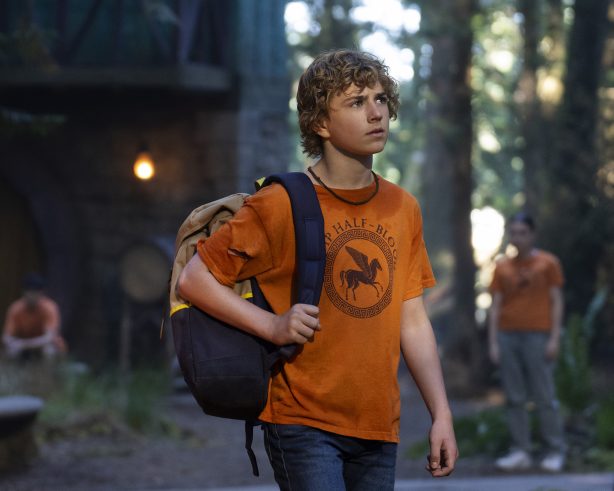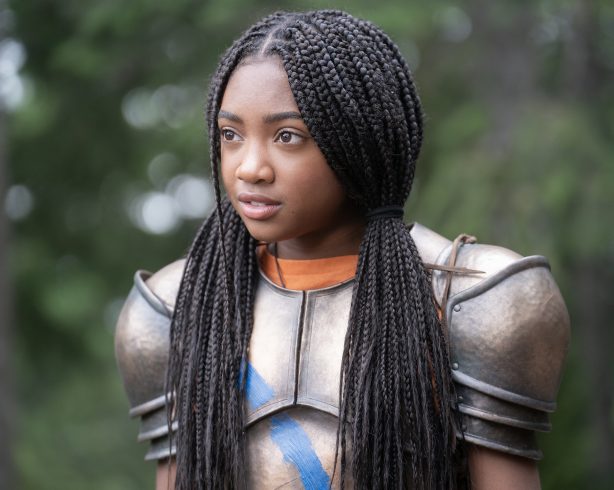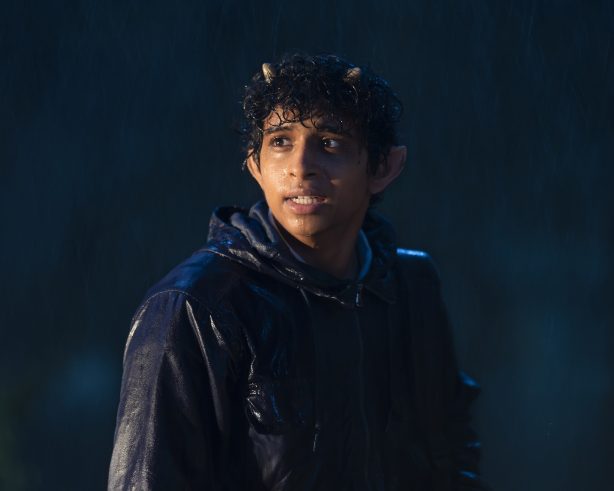Based on Disney Hyperion‘s best-selling book series by award-winning author Rick Riordan, the Original series Percy Jackson and the Olympians premieres Wednesday, December 20, with two episodes, exclusively on Disney+. It follows 12-year-old Percy Jackson (Walker Scobell), who must journey across the U.S. to return Zeus’ master bolt and stop an all-out war—all while outrunning monsters and outwitting gods with the help of his two new friends, Annabeth Chase (Leah Sava Jeffries) and Grover Underwood (Aryan Simhadri).
Riordan has published six Percy Jackson books since 2005, with a seventh due in 2024. Two novels were adapted into feature films: Percy Jackson & The Olympians: The Lightning Thief (2010) and Percy Jackson: Sea of Monsters (2013), both distributed by 20th Century Fox. Ahead of the series’ highly anticipated debut, executive producers Jon Steinberg and Dan Shotz reflect on the epic quest they embarked upon to do right by the characters and story.
What excited you most about adapting such an ambitious novel for television?
Jon Steinberg: It was the prospect of being able to make a show that could do almost anything you can imagine and that could be for almost anyone you can imagine. There’s just not that many of those shows. It requires a tremendous commitment to get the kind of resources you need to make a giant adventure that’s also willing to speak to its different constituencies in different languages. It’s OK for this to talk to adults in a different way than it talks kids. There’s just a whole constellation of opportunities baked into that. The moment they said, “Are you interested?” the answer was, “Yes!” It was the easiest “yes” ever.
Dan Shotz: Working with Rick, the person who created the source material, and having him and his family as collaborators throughout this process made it a little less scary. Even though you’re challenging yourself, you’re getting to work with the full understanding of where everything came from, where the themes came from, where the characters came from, as well as why he chose certain things. To be in those conversations with him throughout literally every step—from story and script to casting and production to set to post—we had a wealth of information. We understood every decision he made, and [that informed] decisions we made as a team. Then, it was about how they talked to each other.

Rick is very protective of his characters, as any author would be. How did he help you fill in the blanks for each character, given that audiences will be getting more time to spend with them onscreen than ever before?
Jon: The biggest resource that Rick provided was saying, “This thing you’re trying belongs in the Percy Jackson universe. This thing you’re trying doesn’t smell right to me.” We didn’t feel like there was any explanation required beyond that. This is a universe of his making, a fanbase of his making, and a story of his making. It creates a real sense of freedom to try new things when you know you’re never going to get too far away from the target; you’ve got a spotter telling you when you’re on it and when you’re not. He had a real willingness to play that role without being defensive. There was a real desire on his part, and on his wife’s part, to let the reins out a little bit and allow this to be fun. This isn’t going to be just a tribute band that plays all the hits. This is something that wants to live in that world and surprise you as much as it gratifies your sense of nostalgia or the things you know you want to see—because if all it shows you is what you know you want to see, it’s not doing its job.
What are the benefits of adapting this story serially as opposed to in a feature film?
Jon: I think there are books that probably translate themselves really cleanly into a feature format, and this is definitely not one of them. There’s just too much stuff—and this stuff is important. The sense of the journey is important, and the mystery in all of its evolutions is important. It’s part of what people fell in love with. To try to squash it into 115 pages is a losing battle. And so, this format actually mapped out in a really clean way. This was about the length it took to do everything we wanted to do. I don’t think there was anything left afterward where anybody walked away from it feeling like, “I regret that didn’t make it in.”
Dan: While people love this book series for its massive canvas, the Greek mythology, the creatures, and the adventures, I think the reason it’s kept its connection with people is because of its characters. When you have characters that you need to invest in, you need that time. You need to have quiet scenes. You need to understand where they’re coming from. We got a lot more real estate to spend time with each one of them, and then them together. It makes all the difference, because that’s really why everyone is coming to this.

The three leads have incredible chemistry. How did you find them?
Jon: This was the most “you’ll know it when you see it” kind of an exercise there is, and I think deliberately so. The conversations that happened before casting started were less about what we’re looking for and more about what we want to feel and what we want to be open to. I’m reasonably confident that if we had started trying to create a sense of who these characters were in a really specific way before we went looking for the actors, we might not have found them. Because I think each one of them brought something to this that was really unexpected. But at the same time, the moment you see it, you feel like, “I want that to be a part of the show, and that already feels like a part of this character I didn’t even know it was there.” It happened with all three of them. Each one of those kids walked in the door and said or did something that made it impossible to cast anyone else.
Throughout the season, Walker, Leah, and Aryan go toe-to-toe with some of Hollywood’s biggest actors, from Lin-Manuel Miranda and Megan Mullally to Jason Mantzoukas and Glynn Turman. How did you assemble such a big roster of guest stars?
Dan: It’s all over the board, really. Some had kids who loved the book series, some were fans themselves, and some were just people we’ve been desperate to work with. Because we’re part of something substantial, they wanted to be a part of it as well. Others were people we’ve worked with before; even in the in the writing, we were thinking about them. So, we just wanted these people to fit their parts, and across the board, everybody nailed it.

The visual effects are integral to the story, and they’re done quite elegantly. How did you achieve that, and how did you ensure the story remains grounded in spite of that?
Jon: Our early conversations with James Bobin, who directed the first two episodes, and with Rick and his wife, Becky, were about what we wanted this to feel like. What’s our ambition? Very quickly, there was a meeting of the minds that this story wants to be taken seriously. It can be goofy—it wants to be goofy—but it also wants to feel real. You want to feel like the people who made it cared and took it seriously enough so that you can as well. Some of that you want to come across in its visual effects and in its fantasy elements, without making it feel like anything is there to tick a box; nothing is ever there to show you how clever we are. It’s all there to finish a story, so that you feel like you’re experiencing it the way the characters are. From there, you just have to find the people who can do it. And so, like anything else in this process, you find great people and you let them do their work.
Dan: Hire pretty awesome people. We worked with ILM [Industrial Light& Magic]; Erik Henry and Matt Robken were our lead team for VFX, and a lot of other houses came on board to deliver this. It was full-on. It took a very long time, but it was worth all the effort.
Have you begun brainstorming ideas for additional seasons?
Dan: The goal has always been to make more of these. We would love to. There are some things happening, but for right now, we are just so excited for these episodes to get out into the world—for people see it. It’s been a long time coming. We’ve spent the past four years with the Riordans trying to get this to air, so we’re pretty grateful that it’s finally here.